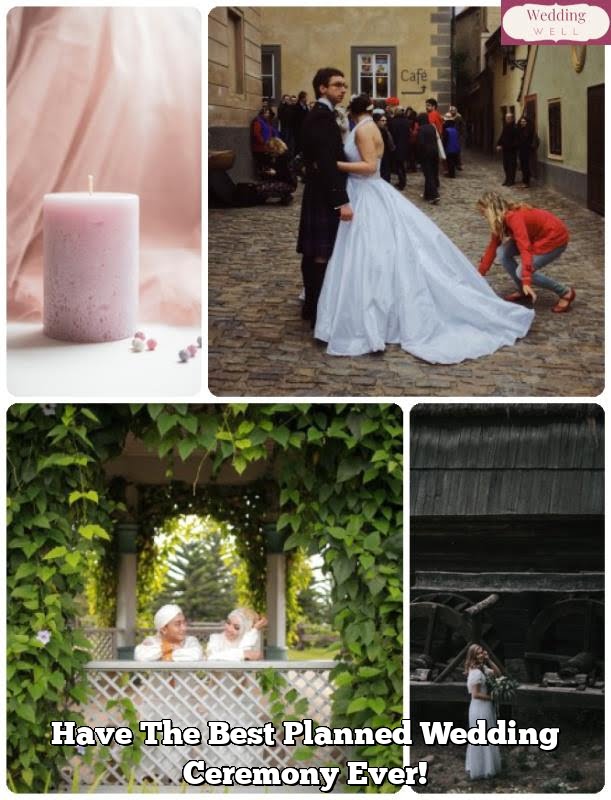Have you ever wondered how long is a wedding ceremony? From traditional customs to modern trends, the length of a wedding ceremony can vary widely depending on various factors.
In this article, we will explore the different lengths of wedding ceremonies around the world, factors that influence their duration, and tips for planning a ceremony that suits your style. Whether you’re looking for a short and sweet ceremony or ways to keep a longer ceremony engaging for guests, we’ve got you covered.
Wedding ceremonies are an integral part of celebrating the union of two individuals in love. They often reflect cultural traditions, personal beliefs, and the couple’s unique style. Understanding the factors that contribute to the length of a wedding ceremony can help couples plan an event that truly represents them and creates lasting memories for everyone involved.
Throughout this article, we will delve into the average length of wedding ceremonies in different cultures, discuss common elements that impact their duration, and provide helpful tips for personalizing your ceremony length. Whether you’re aiming for a traditional ceremony or something more unconventional, our insights will give you valuable guidance as you plan your special day. So let’s explore the diverse world of wedding ceremonies and discover how to make yours perfect in every way.
Traditional Wedding Ceremony Lengths Around the World
Wedding ceremonies are significant events that mark the beginning of a couple’s journey together. Across the world, different cultures and traditions have varying lengths for their wedding ceremonies, each with its own unique customs and rituals. Understanding how long traditional wedding ceremonies are in different parts of the world can provide valuable insights for couples as they plan their own special day.
In many Western cultures, a traditional Christian wedding ceremony typically lasts between 30 minutes to an hour. This includes the processional, vows, exchange of rings, readings, prayers, and the recessional. In contrast, Hindu wedding ceremonies in India can range from several hours to multiple days, depending on the specific customs observed by the families involved.
Other cultures such as those in Japan or Korea may have relatively shorter wedding ceremonies that last around 15 to 30 minutes. These ceremonies often include rituals like exchanging sake cups or bows as a way of honoring and respecting tradition. Meanwhile, some African wedding ceremonies can span an entire day or even multiple days, showcasing vibrant dances, music, and feasting as part of the celebration.
While these are just a few examples of traditional wedding ceremony lengths around the world, it’s important for couples to consider their own cultural backgrounds and personal preferences when planning their special day. Whether embracing longstanding traditions or creating new ones, understanding the various ceremonial lengths can help couples personalize their wedding ceremony to reflect their unique love story.
- Some examples of traditional wedding ceremony lengths around the world:
- Christian weddings: 30 minutes to an hour
- Hindu weddings: Several hours to multiple days
- Japanese or Korean weddings: 15 to 30 minutes
- African weddings: An entire day or multiple days
Factors That Influence the Length of a Wedding Ceremony
There are several factors that can influence the length of a wedding ceremony. One of the main factors is the type of ceremony being held. For example, a religious wedding ceremony may be longer due to specific rituals, readings, and prayers that are typically incorporated into the service. On the other hand, a civil ceremony may be shorter and more concise.
Another factor that influences the length of a wedding ceremony is the number of guests in attendance. A larger guest list may require more time for seating, walking down the aisle, and exchanging vows, which can add to the overall duration of the ceremony. Additionally, if there are cultural or traditional customs to be observed, this can also impact how long the ceremony will last.
The couple’s personal preferences also play a significant role in determining the length of their wedding ceremony. Some couples may want a brief and intimate ceremony, while others may want to include various elements such as unity rituals, readings, or musical performances, which can extend the duration of the proceedings.
Average Length of a Wedding Ceremony in Different Cultures
An average length of a wedding ceremony in various cultures.
Wedding ceremonies are an important traditional event in every culture around the world. They mark the union of two individuals and are often accompanied by unique customs and rituals that vary from one culture to another. One significant aspect of a wedding ceremony that differs across cultures is the length of the ceremony itself.
In India, a traditional Hindu wedding ceremony can last anywhere from one to three days, with each day dedicated to specific rituals and traditions. In contrast, a traditional Japanese Shinto wedding ceremony generally lasts about 20 to 30 minutes, consisting of rituals such as san-san-kudo (a symbolic drinking of sake) and the exchange of nuptial cups.
In Western cultures, the average length of a wedding ceremony typically ranges from 30 minutes to an hour, depending on religious or cultural traditions.
It is fascinating to see how different cultures approach the length of their wedding ceremonies, but regardless of these variations, the significance of this event remains constant. Whether it’s a short and sweet affair or an elaborate multi-day celebration, every wedding ceremony holds deep cultural and emotional value for those involved.
| Culture | Typical Length |
|---|---|
| Hindu (India) | 1-3 days |
| Shinto (Japan) | 20-30 minutes |
| Western Cultures | 30 minutes – 1 hour |
Tips for Planning a Short and Sweet Ceremony
As you plan your wedding ceremony, you may be wondering how long is a wedding ceremony supposed to last. While traditional ceremonies can vary in length, there are some tips for planning a short and sweet ceremony that will keep you and your guests engaged.
Here are a few tips to consider when planning a shorter ceremony:
1. Keep the readings and speeches concise: Consider limiting the number of readings or speeches during the ceremony to keep it moving along. Choose meaningful passages or quotes that are brief but impactful.
2. Streamline the rituals: If you’re incorporating cultural or religious rituals into your ceremony, find ways to shorten them while still honoring their significance. For example, in some traditions, the bride and groom may exchange multiple sets of vows or perform lengthy rituals. You can opt to focus on one central vow exchange or simplify the ritual without losing its essence.
3. Time the processional and recessional: Coordinate with your wedding party and officiant to ensure that the processional and recessional move efficiently. Practice walking at a comfortable pace and make sure everyone knows their cues.
By implementing these tips, you can create a wedding ceremony that is both meaningful and efficient, ensuring that you and your guests have an enjoyable experience without dragging on for too long. After all, your wedding day is about celebrating love, and keeping the ceremony short and sweet allows everyone to fully focus on this special moment without getting antsy.
How to Keep a Long Ceremony Engaging for Guests
When planning a wedding ceremony, one of the main concerns for couples is how to keep their guests engaged throughout the entire event. A long ceremony can sometimes lead to restlessness and disinterest among attendees, so it’s important to consider ways to ensure everyone remains engaged and involved. Here are some tips on how to keep a long ceremony engaging for guests.
Include Interactive Elements
One way to keep guests engaged during a long wedding ceremony is to include interactive elements that involve them in the proceedings. For example, you can incorporate audience participation through readings, songs, or rituals that invite guests to join in. This not only keeps them actively involved but also adds a personal touch to the ceremony.
Provide Comfortable Seating
Another important factor in keeping guests engaged during a lengthy wedding ceremony is ensuring that they are comfortable. Uncomfortable seating arrangements can lead to distraction and restlessness, so it’s crucial to provide adequate and comfortable seating for your guests. Consider renting chairs with cushions or providing blankets for outdoor ceremonies to make sure everyone stays relaxed and focused on the proceedings.
Offer Refreshments
Long ceremonies can leave attendees feeling hungry and thirsty, which can be distracting and cause them to lose interest. To avoid this, consider offering refreshments such as water, juice, or light snacks before or during the ceremony. This not only helps keep guests focused but also shows hospitality and consideration for their comfort.
By incorporating these strategies into your wedding ceremony planning, you can help ensure that your guests remain engaged throughout the event, regardless of how long is a wedding ceremony. These small details can make a big difference in creating an enjoyable experience for both you and your loved ones on your special day.
Common Elements of a Wedding Ceremony That Impact Length
Religious or Cultural Traditions
One of the most significant factors that can impact the length of a wedding ceremony is the religious or cultural traditions involved. For example, a traditional Catholic wedding ceremony may include several rituals and readings, making it longer than a civil ceremony.
Hindu wedding ceremonies, on the other hand, can last several hours due to the various customs and rituals involved. It’s important for couples to consider the influence of their religious or cultural background on the length of their wedding ceremony.
Number of Readings and Rituals
The number of readings, rituals, and ceremonial elements included in a wedding ceremony can also have a direct impact on its length. From exchange of vows and rings to lighting unity candles and performing cultural customs, each additional element adds time to the overall duration of the ceremony. Couples should carefully consider which traditions and rituals are meaningful to them and prioritize those that will enhance their special day without unnecessarily prolonging the proceedings.
Ceremony Venue
The choice of venue for the wedding ceremony can also impact its length. A small intimate gathering in a backyard may lead to a shorter, more casual ceremony, while a grand cathedral setting could result in a longer and more formal affair. The size and acoustics of the venue can also affect how long certain ceremonial elements take to execute, so couples should factor in these considerations when planning their ideal wedding ceremony.
Personalizing Your Wedding Ceremony Length to Fit Your Style
In conclusion, the length of a wedding ceremony is not set in stone and can be personalized to fit the style and preferences of the couple getting married. While traditional wedding ceremony lengths may vary around the world, there are several factors that influence how long a ceremony lasts. From cultural norms to personal preferences, there is no one-size-fits-all answer to how long a wedding ceremony should be.
One of the key tips for planning a wedding ceremony that fits your style is to prioritize what elements are most important to you and your partner. Whether it’s incorporating cultural traditions, exchanging personalized vows, or including religious rituals, focusing on what holds meaning for you will help create a ceremony that feels true to your relationship.
Additionally, communicating with your officiant or planner about your vision for the ceremony length can also ensure that it aligns with your desired timeframe.
Ultimately, keeping in mind the overall flow of the event and considering the comfort of your guests can help guide your decision on how long to make your wedding ceremony. By carefully considering these factors and making intentional choices about which elements to include, couples can create a personalized and meaningful wedding ceremony that reflects their unique love story.
After all, the goal is to create a memorable experience for all involved, regardless of how long or short the ceremony may be.
Frequently Asked Questions
How Long Is a Wedding Ceremony Usually?
A typical wedding ceremony usually lasts between 20 to 30 minutes, although it can vary depending on the couple’s preferences and any cultural or religious traditions they choose to incorporate.
How Long Is a Wedding Ceremony Timeframe?
The timeframe for a wedding ceremony can range from 15 minutes for a simple civil ceremony to over an hour for a more elaborate religious or multicultural ceremony. It all depends on the specific customs and rituals involved.
How Long Should an Entire Wedding Be?
The entire duration of a wedding, including the ceremony, reception, and any other festivities, is usually around 4 to 6 hours. However, some weddings may last longer if there are multiple events or if the couple prefers an extended celebration with their guests.

Welcome to my blog about home and family. This blog is a place where I will share my thoughts, ideas, and experiences related to these important topics. I am a stay-at-home mom with two young children. I hope you enjoy reading it! and may find some helpful tips and ideas that will make your home and family life even better!





